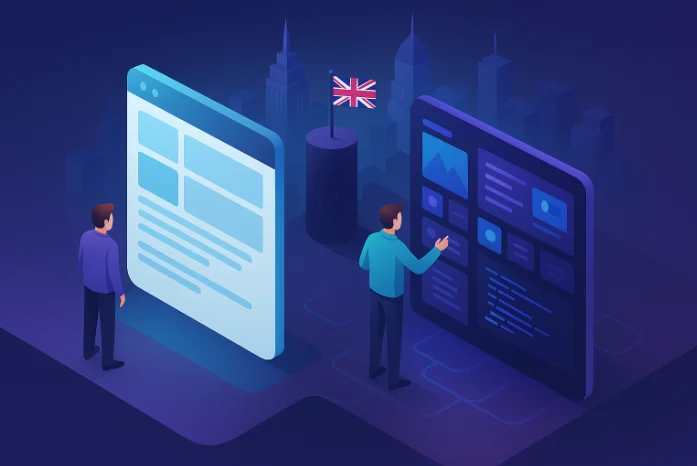By 2026, the UK digital landscape has become more competitive than ever. Consumer expectations have risen sharply — users demand faster loading times, personalised experiences, and seamless functionality across every device. Even small businesses are now expected to deliver enterprise-level performance. According to recent UK consumer experience research, 82% of users say a slow or poorly designed website negatively impacts their trust in a brand.
In this environment, choosing between a template website and a bespoke, professionally engineered site is no longer just a design decision — it’s a strategic business choice that directly affects customer acquisition, retention, and long-term ROI.
What Are Template Websites?
Template websites are pre-built designs and layouts offered by platforms such as Wix, Squarespace, Shopify, and WordPress themes. They allow businesses to launch quickly using ready-made components and drag-and-drop builders. For startups with minimal digital needs, templates offer:
- Fast deployment — a site can be up within hours.
- Lower upfront costs — ideal for tight budgets.
- Beginner-friendly editing — minimal technical skills required.
However, template websites come with significant trade-offs, especially for brands looking to scale:
1. Design & Functional Limitations
Templates follow rigid layout structures. Businesses often end up adjusting their brand to fit the template — not the other way around. Custom interactions, unique layouts, or advanced filtering systems are either impossible or require expensive third-party add-ons.
2. Performance Constraints
Template platforms load unnecessary scripts, unused CSS, and generic functionality. This makes sites heavier and slower. In 2026, where Core Web Vitals heavily influence SEO rankings, slow templates limit growth.
3. Scalability Issues
Most templates are not designed to handle complex product catalogues, large traffic spikes, or custom integrations with CRMs, booking engines, AI-powered chat tools, or internal systems.
4. Security & Compliance Risks
You are at the mercy of the platform’s security. Popular templates are common targets for automated attacks, and plugin-heavy setups increase vulnerabilities. This is especially problematic for UK businesses operating under strict data privacy expectations.
What Is Bespoke Website Development?
Bespoke websites are built from the ground up to match the brand’s goals, workflows, and long-term digital roadmap. Unlike templates, every component — from design to database architecture — is crafted to meet unique business requirements. This approach, often referred to as Bespoke Web Development, allows companies to engineer a digital experience that performs better, scales smoothly, and delivers measurable ROI.
Key Characteristics of Bespoke Development
1. Tailored User Experience (UX)
User journeys are mapped around real customer behaviour, not generic layouts. This leads to better engagement, higher conversions, and seamless functionality at every interaction point.
2. Optimised Technical Architecture
Developers build only what the business needs — nothing more, nothing less. This reduces code bloat, improves security, and enhances load speed.
3. Modular, Scalable Systems
Custom sites use frameworks such as Laravel, Next.js, or Symfony, enabling modular upgrades without rebuilding the entire site. As the business grows, the website grows too — efficiently.
4. Enhanced Security
Custom security hardening, encrypted data flows, and well-maintained codebases make bespoke websites far more resilient against vulnerabilities common in template ecosystems.
5. Seamless Integrations
Whether connecting to internal stock systems, CRM pipelines, payment gateways, or AI automation tools, bespoke development supports custom integrations that templates simply can’t handle.
Key Differences Between Template and Custom Websites
1. Design Flexibility
- Template: Inflexible layouts, limited component logic.
- Bespoke: Any layout, interaction or workflow can be created.
2. Performance & Speed
- Template: Bloated code, slow load times, generic hosting.
- Bespoke: Lightweight code, optimised assets, high-performance hosting setups.
3. SEO & Core Web Vitals
- Template: Harder to achieve high Lighthouse scores.
- Bespoke: Developers can optimise structure, schema markup, caching, and server response times.
4. Security Posture
- Template: Dependent on platform updates and plugin ecosystem.
- Bespoke: Custom-hardened builds with fine-grained control.
5. Integrations & Advanced Functionality
- Template: Limited to pre-approved apps.
- Bespoke: Custom API integrations and automated workflows.
6. Scalability & Long-Term Maintenance
- Template: Performance issues appear as traffic grows or features are added.
- Bespoke: Designed for long-term scalability across architecture, infrastructure, and UX.
Why Bespoke Websites Deliver Higher ROI for UK Businesses in 2026
A well-built custom site is not just a digital brochure — it’s an asset engineered to generate revenue, reduce bottlenecks, and support long-term growth. In 2026, businesses relying on templates find themselves limited by the platform’s constraints, leading to increased costs and technical debt over time.
One notable industry insight: Custom-built websites now achieve 35–45% higher conversion rates compared to template-based alternatives — largely due to superior UX, faster speeds, and clearer user pathways.
Below are the main ROI drivers behind bespoke websites:
1. Enhanced User Experience = Higher Conversions
Custom UX design aligns with your customers’ actions, goals, and expectations. The smoother the journey, the higher the conversion rate and the lower the abandonment rate.
2. Fully Optimised Performance
Fast websites rank better, convert better, and build trust. Bespoke sites can achieve sub-1-second load times — something templates struggle with.
3. Built for AI and Automations
The 2026 business landscape relies heavily on automation. Custom websites can integrate AI chatbots, predictive search, personalised recommendations, and workflow automation tools directly into the architecture.
4. Avoiding Hidden Template Costs
Plugins, platform fees, app subscriptions, and performance upgrades add up quickly. Over a 3–5 year period, bespoke becomes more cost-effective.
UK Market Factors Driving 2026 ROI Trends
Several UK-specific trends are amplifying the value of bespoke websites in 2026. These aren’t just global digital shifts — they reflect the unique regulatory, behavioural and technological landscape of the UK market.
1. Stricter Data & Privacy Regulations
With expanding UK GDPR enforcement and increased consumer awareness of data practices, businesses must deliver secure, transparent digital experiences. Template platforms store data in predefined ways and often rely on multiple third-party plugins — each one creating another compliance point. Custom builds can be engineered with:
- Minimal data exposure
- Custom encryption
- Clean audit trails
- Secure hosting environments
- Role-based access systems
This reduces compliance risk and enhances reputational trust.
2. Mobile-First Behaviour from UK Consumers
Over 70% of UK online activity now takes place on mobile devices, and mobile conversions are rising year-on-year. Template layouts often struggle with complex responsive behaviour or advanced mobile UX. Bespoke builds, by contrast, use:
- Custom breakpoints
- Mobile micro-interactions
- Performance-optimised image delivery
- Lightweight mobile-first CSS approaches
These elements directly impact conversions for UK audiences who shop, browse, and book predominantly on mobile.
3. Rise of AI-Driven Interactions
From personalised product suggestions to AI-powered support channels, UK users expect smarter digital experiences. Templates usually rely on generic apps for AI features — these are slow, restrictive, and often lack data integration. Custom builds can integrate AI:
- Product recommendations
- Predictive search
- Intelligent CRM workflows
- Personalised content delivery
- Chat and support automations
These deliver measurable improvements in engagement and revenue.
4. Industry-Specific Digital Demands
Different UK sectors require far more customisation than templates can support:
- E-commerce: custom product filters, real-time stock sync, advanced checkout journeys
- Property: custom search logic, map integrations, automated CMS feeds
- Trades: dynamic quoting engines, location-based service areas
- Finance: secure portals, strict compliance workflows
- Healthcare: encrypted patient interactions, booking integrations
Bespoke development is often the only viable option for these industries.
Cost Comparison: Template vs Bespoke (2026 Reality Check)
A common misconception is that templates are significantly cheaper. While upfront cost is lower, the total cost of ownership often tells a different story.
Template Website Costs
- Platform subscription fees
- Plugin/app costs (usually £10–£100/month per app)
- Premium template fees
- Developer fees for custom workarounds
- Performance optimisation add-ons
- Higher SEO maintenance costs
- Redesign costs when scaling becomes impossible
Over 3–5 years, these expenses typically add up to 2–3× the initial estimate.
Bespoke Website Costs
- Higher upfront investment
- Lower dependence on paid plugins
- Lower risk of redesign
- Cheaper long-term maintenance due to structured architecture
- Infrastructure optimised to business needs, not generic workloads
When measured over the same 3–5 year period, bespoke builds are often more economical, especially for businesses generating revenue directly through their website.
How to Decide Which Approach Is Best for Your UK Business
Not every business needs a custom build — but most growing UK businesses will benefit from one. Use the following criteria to guide your decision:
Choose a Template If:
- You’re a very early-stage business
- You need a simple online presence with minimal functionality
- You aren’t expecting high traffic or rapid growth
- You have a very limited budget
- You only need static pages and a basic contact form
Choose Bespoke Development If:
- Your website is crucial to sales, lead generation, or customer experience
- You require advanced functionality or integrations
- Speed, SEO, and conversion rates matter
- You’re aiming to scale significantly in the next 2–4 years
- You need tighter security, privacy controls, or industry-specific compliance
- You want a long-lasting digital asset rather than a temporary solution
Key Questions to Ask Yourself
- Will my website need to grow in complexity?
- Do I handle sensitive customer or business data?
- How important is search engine visibility?
- Do I need custom workflows, dashboards, or integrations
- What are the long-term costs of staying on a template platform?
Answering “yes” to most of these indicates that bespoke is the more strategic choice.
Conclusion
As the UK enters an increasingly competitive digital era, the limitations of template websites become more apparent — especially when speed, security, SEO, and user experience directly impact revenue. A custom-built website is not just a design upgrade; it is a long-term investment engineered to deliver measurable ROI through higher conversions, better performance, stronger security, and future-ready scalability.







